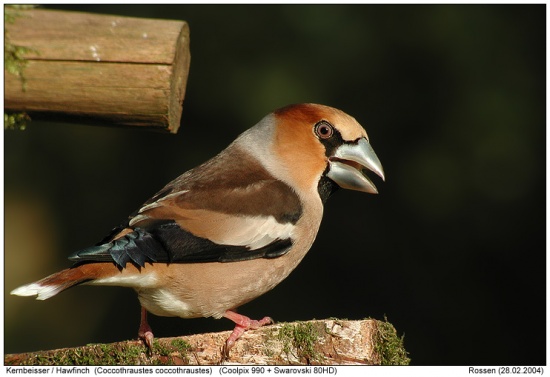| Line 4: | Line 4: | ||
Photographed in northern Germany | Photographed in northern Germany | ||
==Identification== | ==Identification== | ||
| − | + | ==Distribution== | |
| + | Widely distributed but generally uncommon in much of the Region. Breeds in southern Scotland and England and from the Pyrenees and western France to Denmark, southern Sweden and the Baltic States east to Russia and the Urals. In the south breeds in southern Iberia and North-West Africa in Morocco, north-east Algeria and north Tunisia. Also Corsica, Sardinia, and Italy, the Balkans, Greece and northern Turkey. Also breeds in the Crimea and Caucasus. | ||
Northern & eastern populations are migratory leaving breeding areas in September-October, returning late March-early May. Elsewhere in range mainly resident or short-distance dispersal only. Winter range more widespread in western and southern Europe especially around the Mediterranean and a scarce winter visitor to the Balearics, Malta and Sicily, Crete and Cyprus and also in the Near East including Lebanon and Israel. | Northern & eastern populations are migratory leaving breeding areas in September-October, returning late March-early May. Elsewhere in range mainly resident or short-distance dispersal only. Winter range more widespread in western and southern Europe especially around the Mediterranean and a scarce winter visitor to the Balearics, Malta and Sicily, Crete and Cyprus and also in the Near East including Lebanon and Israel. | ||
| Line 11: | Line 12: | ||
Subspecies: Three races occur in the Region, the nominate over much of Europe with the darker-backed nigricans in Ukraine and Caucasus and buvryi in North-West Africa which differs from nominate in smaller bill, greyer crown and rump and less white on wings and tail. | Subspecies: Three races occur in the Region, the nominate over much of Europe with the darker-backed nigricans in Ukraine and Caucasus and buvryi in North-West Africa which differs from nominate in smaller bill, greyer crown and rump and less white on wings and tail. | ||
| − | + | ==Taxonomy== | |
==Habitat== | ==Habitat== | ||
Usually occurs in mature deciduous or mixed woodland, often beech and hornbeam, up to 3000m. Also found in some areas in parks, large gardens and orchards. In winter may be seen in more open habitats, along hedgerows and woodland edges. | Usually occurs in mature deciduous or mixed woodland, often beech and hornbeam, up to 3000m. Also found in some areas in parks, large gardens and orchards. In winter may be seen in more open habitats, along hedgerows and woodland edges. | ||
| + | ==Behaviour== | ||
| + | |||
==Comments== | ==Comments== | ||
Revision as of 18:20, 4 June 2007
- Coccothraustes coccothraustes
Photographed in northern Germany
Identification
Distribution
Widely distributed but generally uncommon in much of the Region. Breeds in southern Scotland and England and from the Pyrenees and western France to Denmark, southern Sweden and the Baltic States east to Russia and the Urals. In the south breeds in southern Iberia and North-West Africa in Morocco, north-east Algeria and north Tunisia. Also Corsica, Sardinia, and Italy, the Balkans, Greece and northern Turkey. Also breeds in the Crimea and Caucasus.
Northern & eastern populations are migratory leaving breeding areas in September-October, returning late March-early May. Elsewhere in range mainly resident or short-distance dispersal only. Winter range more widespread in western and southern Europe especially around the Mediterranean and a scarce winter visitor to the Balearics, Malta and Sicily, Crete and Cyprus and also in the Near East including Lebanon and Israel.
Vagrants recorded in Iceland, the Channel Islands, Madeira, Canary Islands and Gibraltar.
Subspecies: Three races occur in the Region, the nominate over much of Europe with the darker-backed nigricans in Ukraine and Caucasus and buvryi in North-West Africa which differs from nominate in smaller bill, greyer crown and rump and less white on wings and tail.
Taxonomy
Habitat
Usually occurs in mature deciduous or mixed woodland, often beech and hornbeam, up to 3000m. Also found in some areas in parks, large gardens and orchards. In winter may be seen in more open habitats, along hedgerows and woodland edges.
Behaviour
Comments
I regularly see Hawfinches at Lynford Arboretum at Mundford, Norfolk.
Well worth a visit but you do need to be patient.
Originally posted by ebuckley
Hawfiches are resident at clumber park in Nottinghamshire all year, the best place to see them is in the chapel gardens,i saw around 8 or 9 in January this year & will hopfully see them again in a few weeks.
Originally posted by paulicharl
Bird Song
<flashmp3>Coccothraustes coccothraustes (song).mp3</flashmp3>
Listen in an external program




